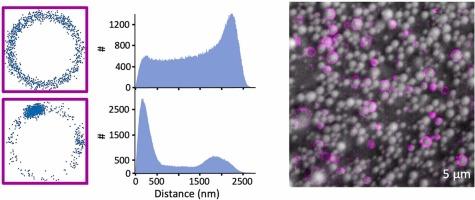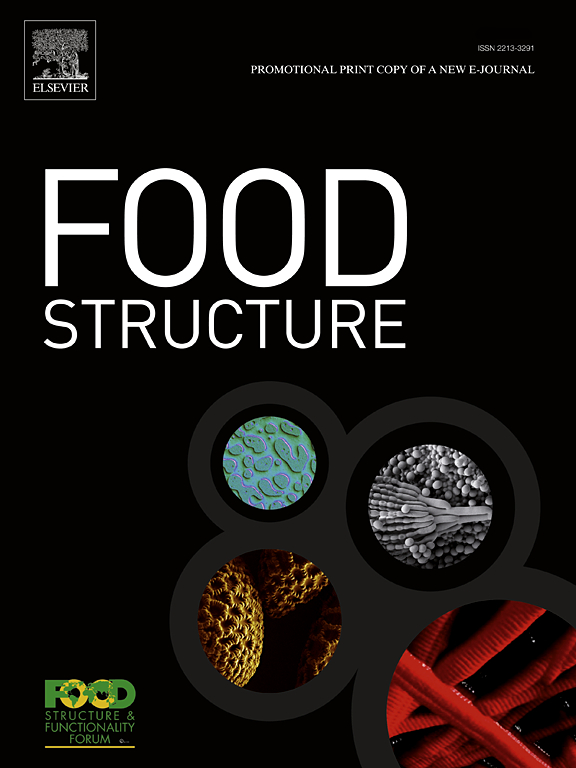Quantifying the distribution of proteins at the interface of oil-in-water food emulsions
IF 5.9
3区 农林科学
Q1 FOOD SCIENCE & TECHNOLOGY
引用次数: 0
Abstract
Emulsifiers play an essential role in ensuring the physiochemical stability of food emulsions. In the case of mayonnaise, proteins contained in egg yolk act as emulsifiers. Here, we employed stochastic optical reconstruction microscopy (STORM) to localize proteins at the oil/water droplet interface using fluorescently labeled antibodies. To quantitatively analyze the distribution of proteins, we first simulated homogeneous and heterogeneous distributions. We then implemented the relative position distribution (RPD) analysis to extract the histogram of relative distances between all neighboring localizations. By analyzing the local maxima of the histogram, we could classify distributions at droplet interfaces as homogeneous, partially heterogeneous, and heterogeneous. The model fitting over the RPD histogram using a 2D probability function further provided a localization precision amplitude consistent with the analysis of the local maxima. As a model system for mayonnaise, we used emulsions prepared with combinations of phosvitin, phospholipids, apolipoprotein B (apoB), and sodium dodecyl sulfate (SDS) as emulsifiers. The binary phosvitin/SDS model emulsion showed a partially heterogeneous distribution of phosvitin around the droplets. The ternary phosvitin/phospholipid/SDS and apoB/phospholipid/SDS emulsions showed increased heterogeneity of phosvitin and apoB. Quantification of heterogeneity at droplet interfaces may provide insights in factors determining the physical and chemical stability of emulsions.

量化蛋白质在水包油食品乳剂界面上的分布
乳化剂在确保食品乳状液的理化稳定性方面起着至关重要的作用。在蛋黄酱中,蛋黄所含的蛋白质就是乳化剂。在这里,我们采用随机光学重建显微镜(STORM),利用荧光标记抗体定位油/水液滴界面上的蛋白质。为了定量分析蛋白质的分布,我们首先模拟了同质分布和异质分布。然后,我们采用相对位置分布(RPD)分析法提取所有相邻定位点之间的相对距离直方图。通过分析直方图的局部最大值,我们可以将液滴界面的分布分为均质分布、部分异质分布和异质分布。使用二维概率函数对 RPD 直方图进行模型拟合,进一步提供了与局部最大值分析一致的定位精度振幅。作为蛋黄酱的模型系统,我们使用了磷脂、磷脂、载脂蛋白 B(apoB)和十二烷基硫酸钠(SDS)组合作为乳化剂制备的乳液。二元磷脂素/SDS 模型乳液显示出磷脂素在液滴周围的部分异质分布。磷脂/SDS 和载脂蛋白/磷脂/SDS 三元乳液显示磷脂和载脂蛋白的异质性增加。对液滴界面的异质性进行定量分析,可帮助人们深入了解决定乳液物理和化学稳定性的因素。
本文章由计算机程序翻译,如有差异,请以英文原文为准。
求助全文
约1分钟内获得全文
求助全文
来源期刊

Food Structure-Netherlands
Chemical Engineering-Bioengineering
CiteScore
7.20
自引率
0.00%
发文量
48
期刊介绍:
Food Structure is the premier international forum devoted to the publication of high-quality original research on food structure. The focus of this journal is on food structure in the context of its relationship with molecular composition, processing and macroscopic properties (e.g., shelf stability, sensory properties, etc.). Manuscripts that only report qualitative findings and micrographs and that lack sound hypothesis-driven, quantitative structure-function research are not accepted. Significance of the research findings for the food science community and/or industry must also be highlighted.
 求助内容:
求助内容: 应助结果提醒方式:
应助结果提醒方式:


